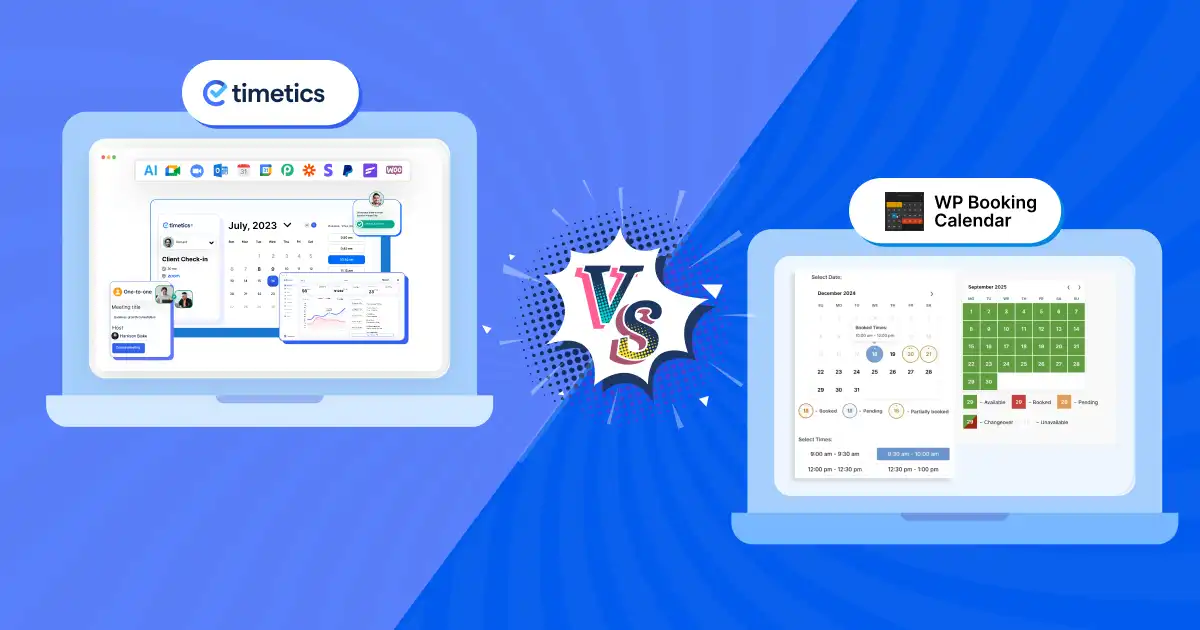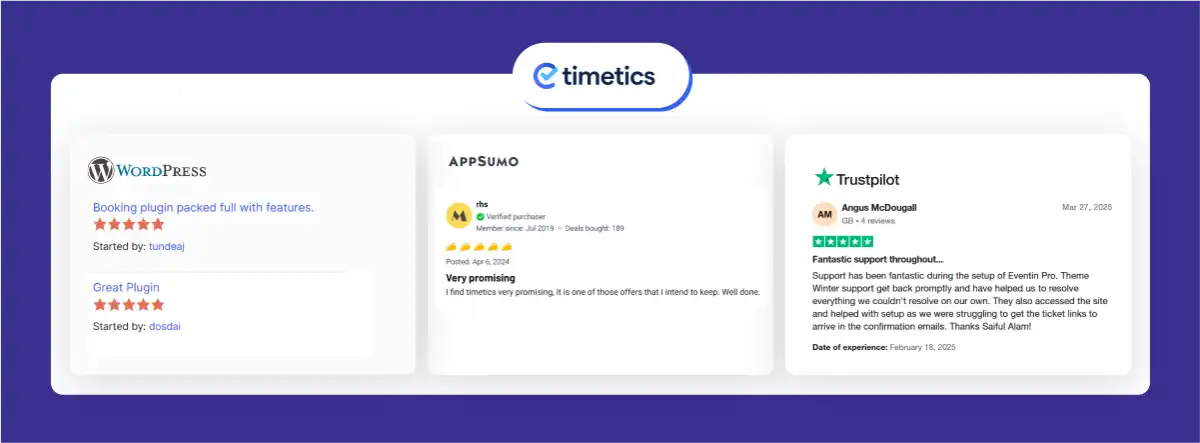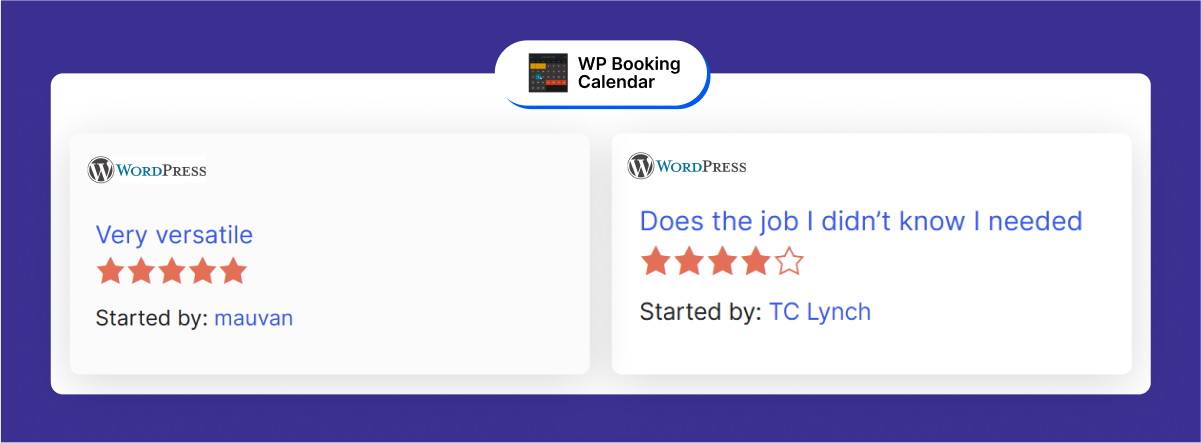WP Timetics vs. WP Booking Calendar: An In-Depth Comparison

When comparing appointment booking plugins for WordPress, two names often arise: WP Timetics and WP Booking Calendar. Both promise a smooth booking and appointment scheduling system, but which one truly delivers on its promises?
Today, we will thoroughly compare two powerful plugins, focusing on their functionalities, user experiences, and pricing structures. Are you a small business owner or a service provider looking forward to upgrading your booking process? This analysis will help you make an informed decision.
Let’s see which is the best booking plugin in WordPress.
⚡ Quick Overview
In this comparison, you’ll learn:
- Which event and booking plugin offers the best value for money
- Which offers a complete booking solution and appointment scheduling
- What types of integrations are available
- Which payment methods are supported
- Pros and cons of each plugin
- What is the price range
WP Timetics vs. WP Booking Calendar core features comparison
WP Timetics is an easy-to-use appointment booking system that offers many features, such as user management and multiple calendar synchronization, to improve booking and appointment scheduling. On the other hand, the WP Booking Calendar is user-friendly and also helpful in managing appointments.
| Features | WP Timetics | WP Booking Calendar |
| Unlimited Appointments | ✅ | ✅ |
| Appointment Calendar View | ✅ | ✅ |
| Automated Notifications | ✅ | ✅ |
| Reschedule Appointments | ✅ | ✅ |
| AI Recommendations | ✅ | ❌ |
| Integration with Zoom/Meet | ✅ | Limited |
| Automatically Detect and Shift to User Timezones | ✅ | ✅ |
| User Dashboard | ✅ | ❌ |
| Appointment Data Export/ Import | ✅ | ✅ |
| Staff Data Export/ Import | ✅ | ❌ |
| Visual Seating Arrangement | ✅ | ❌ |
| Payment Integration | PayPal, Stripe, WooCommerce | PayPal, Stripe, WooCommerce |
| Calendar Synchronization | ✅ | ✅ |
| Manage Multiple Locations | ✅ | ✅ |
| Customizable Booking Forms | ✅ | ✅ |
✴️ Goodreads: Eventin vs.The Event Calendar: An In-Depth Review and Comparison- Read more
WP Timetics vs. WP Booking Calendar price comparison
We include all available plans, ranging from free to lifetime, in our comparison of the WP Booking Calendar and WP Timetics Booking Plugin for WordPress. Selecting a suitable plan is important for organizing your booking strategy.
WP Timetics All Plans
- Free version available
- Basic Plan(2 site): $79/yr (Best for individual freelancers).
- Advance Plan (10 sites): $219/yr (Best for small businesses and startups).
- Agency Plan (100 sites): $499/yr (Best for large agencies).
- For more advanced uses, consider the Lifetime Plan, which allows you to manage up to 500 sites.
Note: All plans include monthly updates and instant support.
For updated pricing information, please visit the website.
WP Booking Calendar All Plans
- Free version available
- Personal (1 site): $79
- Business Small(1 site): $149
- Business Medium(1 site): $249
- Business Large(1 site): $349
- MultiUser(1 site): $649
- Multi-site edition versions (usage on 5 websites) are also available.
Note: Updates and support incur an additional charge of $40 to $324 every 6 months.
For updated pricing information, please visit the website.
WP Timetics vs. WP Booking Calendar: Which is better for you?

When it comes to choosing between WP Timetics and WP Booking Calendar, it’s important to thoroughly evaluate the advantages and disadvantages of each plugin. Below is a detailed breakdown of the pros and cons of WP Timetics and WP Booking Calendar, along with clear guidelines on when to choose each.
WP Timetics pros & cons
| Pros | Cons |
| Advanced Scheduling | Visual setmap features on the premium version |
| User, Host, and Team Management | No mobile app available |
| One to Many Meeting Types | |
| Multi-Language Support | |
| SMS and WhatsApp Notification | |
| Multiple Payment Option |
Choose WP Timetics if:
- Your business needs unlimited bookings with AI recommendations.
- You require features like recurring bookings.
- Integration with third-party tools like Google Calendar
- Your audience is diverse, and you need multilingual support
- You’re willing to invest in long-term benefits.
WP Booking Calendar pros & cons
| Pros | Cons |
| Clear Calendar View | Interfaces can feel outdated. |
| Mobile-Friendly Design | Limited features in the free version. |
| Multiple Custom Booking Forms | Updates and support need extra charge. |
| Multiple Payment Option | |
| Separate Booking Admin Panels |
Choose WP Booking Calendar if:
- You’re looking for customizable booking forms.
- Looking for multiple calendar views—daily, weekly, and monthly to enhance the visualization of appointments and availability.
- Want mobile compatibility that allows users to manage bookings from mobile devices.
📚 Related reading: Wp Amelia vs. BookingPress vs. Bookly vs. Timetics WP: Battle Among the Best WordPress Appointment Booking Plugins 👉 Read more
WP Timetics vs. WP Booking Calendar reviews
Both the WP Booking Calendar and WP Timetics for the WordPress booking system are popular for their user-friendly interfaces and advanced AI features. Here, we have collected some real user reviews from reputable online resources for you.
WP Timetics Booking Plugin for WordPress

- WordPress.org: WP Timetics has earned 4.1 out of 5 stars.
- AppSumo: 4.6/5 positive feedback.
- CodeCanyon: Users rate it 4 stars.
- TrustPilot: Have 4.6/5 rating .
WP Booking Calendar Plugin

- WordPress.org: WP Booking Calendar earned 4.7 out of 5 stars.
- AppSumo: Not listed.
- CodeCanyon: Not listed.
- TrustPilot: Have Not listed.
Conclusion
I hope that now it is easy for you to choose between WP Timetics and WP Booking Calendar. Lastly, we recommend WP Timetics if you want a powerful and customizable booking plugin with AI-driven suggestions and many integration options. On the other hand, if you need a simple and budget-friendly solution for basic bookings, WP Booking Calendar is a good choice.
Tips: Make sure to check the feature list and consider the pros and cons of each plugin. It’s also helpful to use the live demo for both, as it shows how they work.



